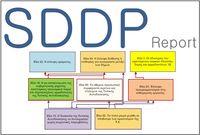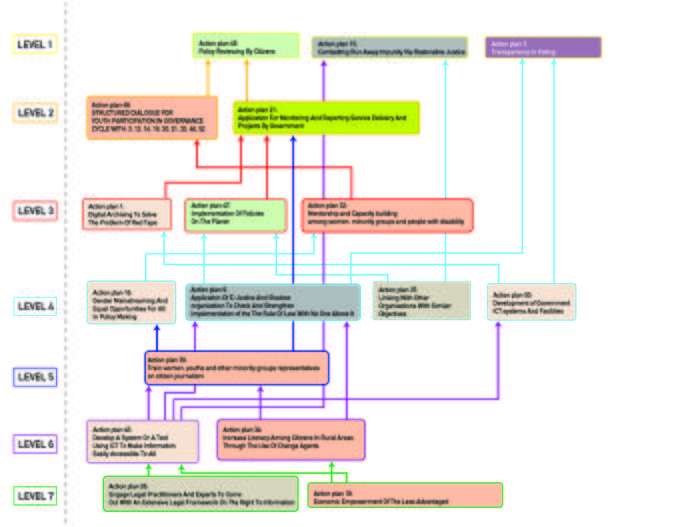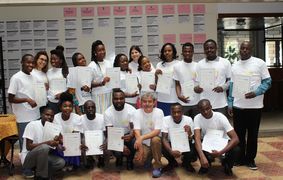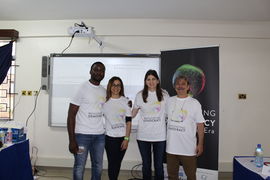SDDP Reinventing Democracy - Actions (African Initiative): Difference between revisions
No edit summary |
No edit summary |
||
| Line 33: | Line 33: | ||
[[File:ReinventingDemocracy_SDDKenya_Μap_Action_Plans.jpg|thumbnail|center| | [[File:ReinventingDemocracy_SDDKenya_Μap_Action_Plans.jpg|thumbnail|center|700px|alt=Influence Map.|Influence tree from the Characteristics SDDP of the Reinventing Democracy workshop for TQ]] | ||
<br> | <br> | ||
Revision as of 04:06, 24 October 2016
|
Executive Summary
This paper reports the results of the second of a series of workshops organized by Future Worlds Center under the auspices of UNDEF. The dialogue was implemented in the context of the Reinventing Democracy in the Digital Era (UNDEF) project. The purpose of this project was to bring together young people from all aroud the world in an attempt to take apart and reconstruct the concept of democracy. The workshop was organized using the structured dialogic design process (SDDP) approach within the context of a rich web-based communication environment. This Co-Laboratoty was organized using the Structured Democratic Dialogue Process (SDDP) approach within the context of a rich web-based communication environment. It is organized by African Initiative.
The Triggering Question (TQ) was
"What concrete action, project or product would you propose to solve a particular shortcoming of current systems of governance?"
In response to the TQ, the 16 participants came up with 57 characteristics, which were categorized in 7 clusters. Following the voting process, 38 ideas received one or more votes and were structured to create the influence MAP shown below.
According to the participants of this workshop, appear to be the most influential were:
- Action Plan 26, Engage legal practitioners and experts to come out with an extensive legal framework on the right to information.
- Action Plan 18, Economic empowerment of the less advantaged.
- Action Plan 39: Train women, youths and other minority groups representatives on citizen journalism.
- Action plan 34: Increase Literacy Among Citizens in Rural Areas Through The Use Of Change Agents.
- Action plan 45: Develop A System Or A Tool Using ICT To Make Information Easily Accessible To All.
Gallery
Participants
| Name | Country |
|---|---|
| Abdulkarim Taraja [1] | Kenya |
| Abel Mavura [2] | Zimbabwe |
| Abiba Abdallah [3] | Ghana |
| Apollo Murigi [4] | Kenya |
| Appiah Evelyn Opoku [5] | Ghana |
| Bill Graham Osei Akomea [6] | Ghana |
| Daniel Ehagi [7] | Kenya |
| Eleanor Opiyo [8] | Kenya |
| Georgina Mabezere [9] | Zambia |
| Gideon Ayodo [10] | Kenya |
| James Gondwe [11] | Malawi |
| Jedidah Millapo [12] | Zambia |
| John Oyaro [13] | Kenya |
| Melvis Lu-uh Kimbi [14] | Cameroon |
| Paul Kasoma [15] | Uganda |
| Rahab Wairimu [16] | Kenya |



